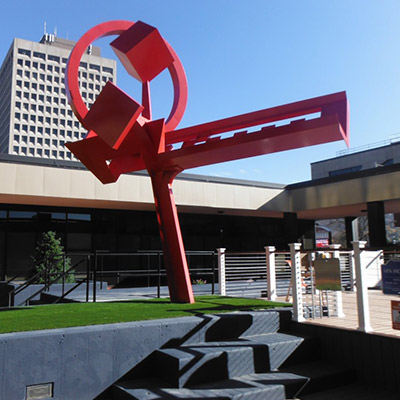Reviewed by George Basler
The Immigrant, now playing at the Chenango River Theatre in Greene, was written more than 30 years ago, but it’s hard not to think about the current controversy over refugees as the play unfolds.
First produced in 1985, Mark Harelik’s play, which runs through Sept. 8 at CRT, is a paean to the immigrant experience in America. While the work is an uneven one, its tenderness and optimism make it an enjoyable if, at times, predictable journey. And its message has added resonance in today’s political climate.
The CRT production is a solid one. Even when the play dips into sentimentality on a few occasions, the production — well directed by Karla Hartley — never lags and never goes over the line into bathos. The four-person cast is a strong one.
Harelik’s play is based on the true story on his own grandparents who, in 1909, came from their native Russia to the small Texas town of Hamilton, becoming the first Jews in the community.
When the play opens, Haskell (Josh Cahn) is a fish out of water, barely scraping by as he sells bananas out of a pushcart in the blistering Texas heat. Taking a break, he stops his cart by the home of the town banker, Milton Perry (Jim Wetzel), and his wife, Ida (Molly Parker-Myers). After some initial bewilderment, which is played comically, the couple hesitatingly welcomes the stranger.
Milton later bankrolls Haskell’s fledgling fruit and vegetable store, which grows into a successful retail store. Along the way, Haskell’s wife, Leah (Paula Shtein), joins him from Russia.
The play focuses on Haskell and Leah’s growing adjustment to American life and the friendship that blossoms between the two couples despite cultural barriers.
The Immigrant has its flaws. The first act is devoid of much dramatic tension. The second act, by contrast, is more complex and compelling — and far more interesting.
What saves The Immigrant from being overly simplistic is Harelik’s emphasis that assimilation is never easy and friendship can be a fragile thing.
This is readily apparent in an intense scene in the second act in which Haskell and Milton have a bitter falling out after arguing over how America should respond to Jewish refugees seeking refuge from the rise of Nazism in Germany in the 1930s.
Haskell believes that the country should welcome more refugees while Milton takes a strongly isolationist position. The scene is a scathing one, even more so because it reveals some latent tension between the two men over how long Haskell needs to be beholden to Milton’s generosity. Cahn and Wetzel play it extremely effectively.
Wetzel gives a finely nuanced performance as the crusty banker, who is both a decent man and someone who has absorbed the casual prejudices of his upbringing.
Cahn has the difficult job of playing Haskell. One problem is that the character, as written by Harelik, is initially presented as an almost cartoonish figure. The comedy is too broad, and Cahn has the tendency to yell, rather than speak, his lines.
But the character grows and develops during the play, and so does Cahn’s performance. Especially well played is a scene in which Haskell tells his wife that he is tired of running — something he has done his entire life — and will not leave Hamilton. Likewise, his argument with Milton is electrifying. The final scene between the two men is heartrending, and Cahn and Wetzel deserve credit for making it so.
Equally important to the CRT production are Shtein and Parker-Myers’ deeply affecting performances as Leah, Haskell’s deeply Jewish wife, and Ida, the banker’s devote Christian wife.
Leah initially feels totally alienated in her new surrounding and worries that Haskell will lose his Jewish traditions and religious faith. Ida carries her own scars. She and Milton are alienated from their only son (the play never explains why, which is a flaw). She is also a deeply committed Southern Baptist and worries about Milton’s rejection of religion.
Some of the play’s best moments are when the two characters put aside their differences to find a common humanity. They share their feelings and comfort each other, forging a relationship based on tolerance and compassion. Shtein and Parker-Myers play these heartwarming moments beautifully.
So, while The Immigrant has its shortcomings, it’s a worthwhile effort especially at a time when bitterness and anger seem to be the order of the day.
The Immigrant reminds us of the better angels of our nature. And that’s a worthwhile accomplishment.
IF YOU GO: The Immigrant will run weekends through Sept. 8 at the Chenango River Theatre, 991 State Highway, Greene. Performances are 7:30 p.m. Thursday, Friday and Saturday, and 2 p.m. Sunday. Tickets are $25, excluding Saturday evenings, which are $27. To purchase tickets, visit chenangorivertheatre.org or call the box office at 656-8499. Book early; performances are selling out.




































